Running a photography website is an excellent way for professional photographers to share work with potential clients, book appointments, and receive payments.
But you should post a comprehensive privacy policy on your website informing visitors of how your site collects, processes, and uses their personal information.
Below, I explain the importance of having a privacy policy for photographers, what goes into one, the laws that affect it, and how you can easily make one for your own website.
- Creating a Photography Website Privacy Policy
- Does Your Photography Website Need a Privacy Policy?
- Which Privacy Laws Affect Photographers?
- Things Included in a Photographer's Privacy Policy
- Where To Display Your Photography Website's Privacy Policy
- Why Data Privacy Is Important for Photographers
- Summary
Creating a Photography Website Privacy Policy
You can make a privacy policy for your photography website by using a managed solution, a template, or writing it from scratch.
Managed Solution
Using a managed solution, like Termly’s free Privacy Policy Generator, is the easiest way to construct a comprehensive privacy policy for your photography business website.
Backed by data privacy experts, it asks easy-to-answer questions about your website and its data processing activities and then makes a unique policy based on your answers.
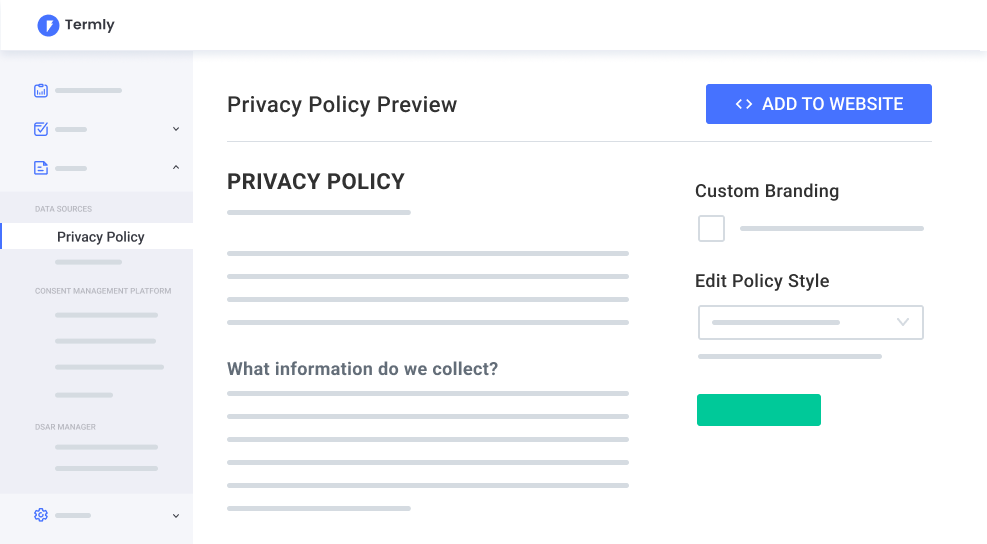
By using Termly’s managed solutions, you can ensure that your privacy policy will correspond to the legal requirements of the privacy laws that may apply to your business.
Template
You can also use a comprehensive privacy policy template to make a privacy policy for your photography site.
Templates take more work than a managed solution because you have to manually fill in blank sections of each clause with details about your business.
However, they’re still very easy to use because they’re properly formatted and include standard language to help speed up the process.
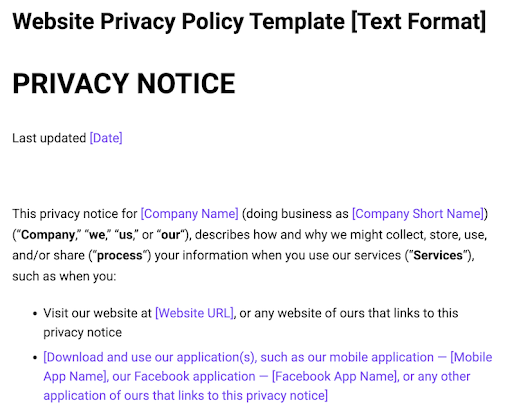
Templates are great options for photography websites that don’t fall under any privacy laws or that don’t collect any personal information.
DIY
You can write your own privacy policy for your photography site if you have extensive knowledge about privacy laws and the data your website collects.
Make sure you mention all cookies that your site uses that collect personal data, list out any third-party service providers you share data with, and have a way for users to contact you to follow through on their privacy rights.
Data privacy laws could hold your business financially accountable if you leave something out.
Does Your Photography Website Need a Privacy Policy?
You need a privacy policy if your photography business meets the legal threshold of any data privacy laws.
Consumers also expect to find one on your site, and according to recent data privacy statistics, presenting them with transparent, honest privacy policies helps build trust.
If you want to use third-party apps from services like Google AdSense or Analytics, you’ll need a legally compliant privacy policy to meet their terms of service.
Which Privacy Laws Affect Photographers?
Any data privacy law can apply to your photography website — it depends on different factors like where you’re located, where your site visitors come from, and how much data you collect.
For example, you might need to comply with one or more of the following:
- General Data Protection Regulation (GDPR)
- California Consumer Privacy Act (CCPA)
- California Online Privacy Protection Act (CalOPPA)
- Children’s Online Privacy Protection Act (COPPA)
- Colorado Privacy Act (CPA)
- Personal Information Protection and Electronic Documents Act (PIPEDA)
- South African Protection of Personal Information Act (POPIA)
- Utah Consumer Privacy Act (UCPA)
Some laws have broad scopes, like GDPR and CalOPPA, which can apply to a photography site if it’s accessible to people in the protected regions and collects their personal data.
Things Included in a Photographer’s Privacy Policy
The specific requirements of your privacy policy may change depending on what laws apply to your business.
But, in general, it should include the following clauses.
What Personal Data You Collect
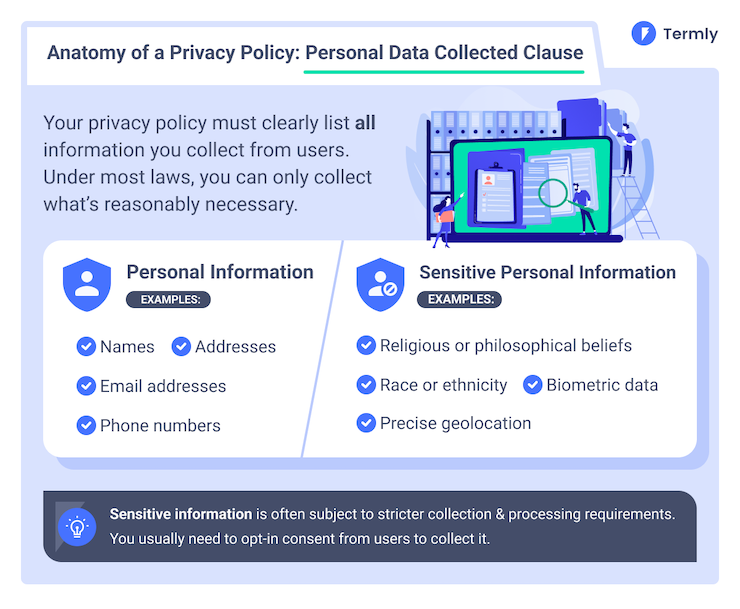
You must disclose any data your photography website may collect from customers in your privacy policy, including:
- Full names
- Email addresses
- Shipping addresses
- Birthdates.
Under some privacy laws, personal data also includes payment information, such as credit card numbers and banking account and routing numbers.
Why You Collect Personal Data
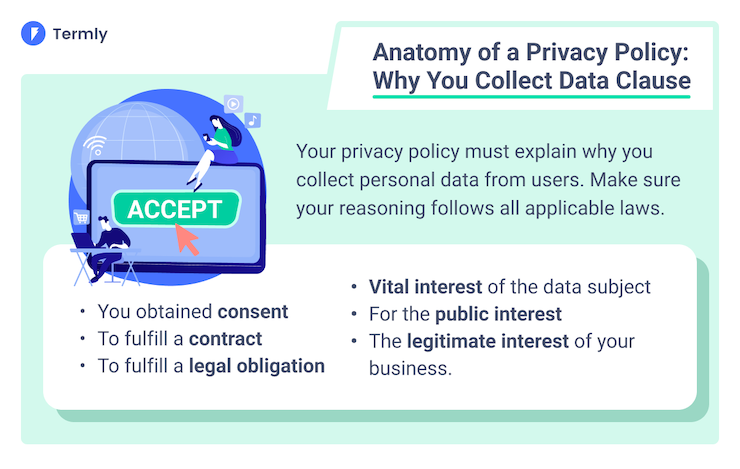
You must inform visitors of your reason for collecting their data.
Under the GDPR, this is known as your legal basis and is limited to six specific purposes. Other laws, like the CCPA, have broader definitions and allow any data collection that is considered reasonable and necessary as long as the purpose is disclosed to consumers in a privacy policy.
For example, you might use it for targeted ads and promotions for upcoming events to a more specialized audience, you must mention this in your policy statement.
Children’s Data Clause
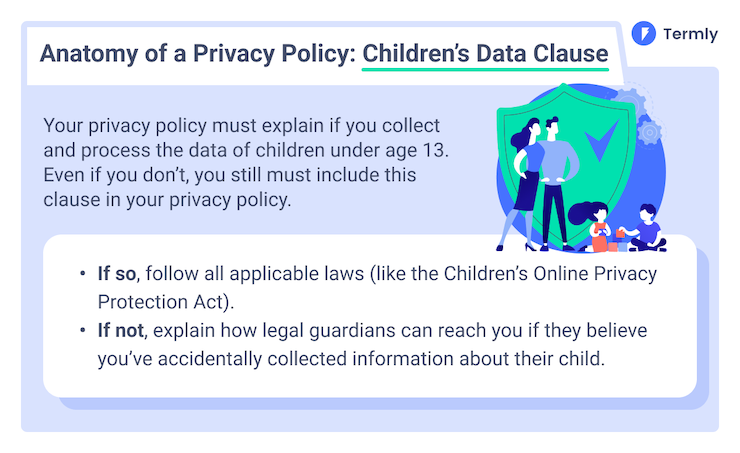
You need a clause in your privacy policy explaining if you specialize in children’s photography or not. If so, you must follow COPPA and meet the law’s privacy notice requirements.
If not, you must explain how parents and legal guardians can contact you if they believe you’ve accidentally collected information about their child.
Data Protection Clause
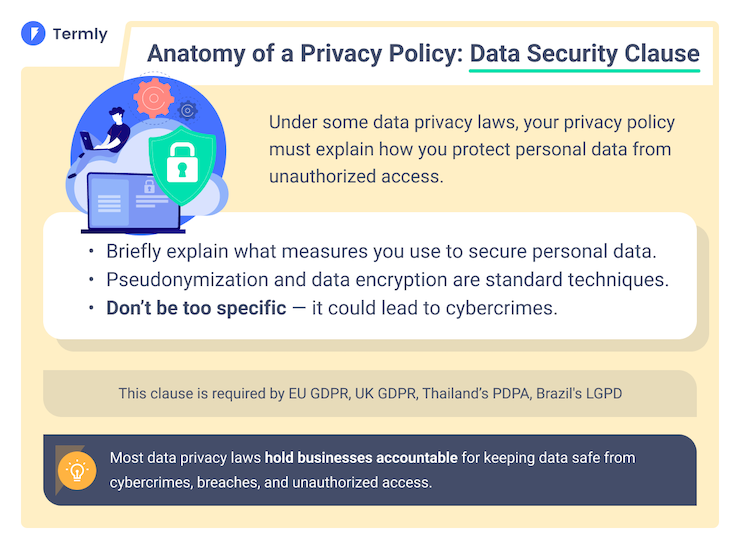
Your privacy policy must inform customers of the steps you’ve taken to protect their data.
Data privacy laws outlined hold businesses responsible when it comes to protecting client’s data, and your privacy policy must inform them of this.
Sharing Data Clause
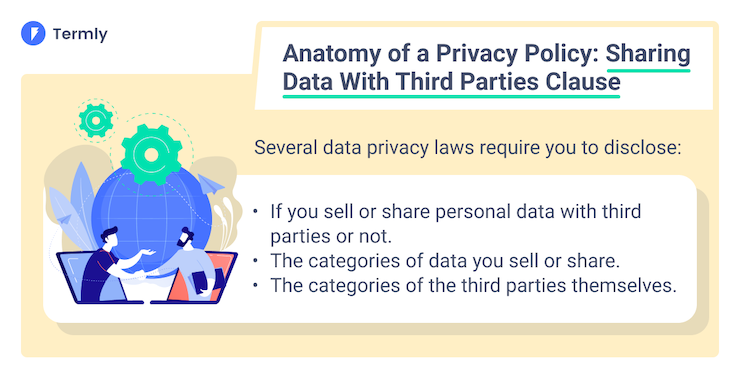
If you share customer data with third-party companies for any reason, including analytics, marketing, sales leads, or customer service improvement, you must inform customers in your privacy policy.
You must also specify what data you share with them.
Cookies and Other Trackers
![]()
You must mention if your photography website uses cookies in a clause in your privacy policy.
Internet cookies qualify as personal data under most privacy laws, and some of them give consumers the right to opt in or out of the use of certain kinds.
Add a link to your more detailed cookie policy directly in this clause so users can easily navigate there and get more information about your cookie use.
Consumer Privacy Rights
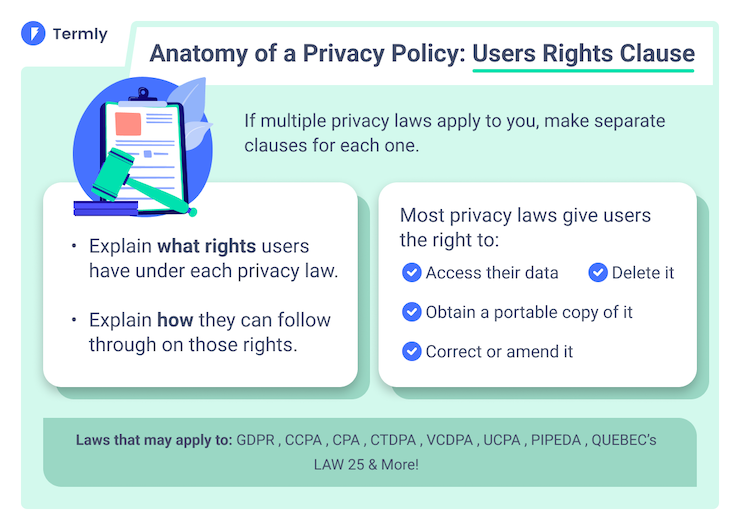
Your privacy policy must explain to consumers the different rights and controls they have over their personal data.
For example, many laws give users the right to access, control, and delete any personal data that you’ve collected.
You also need to explain to them how they can follow through on their rights. Consider linking to a Data Subject Access Request form here to meet this legal requirement.
Company Contact Information
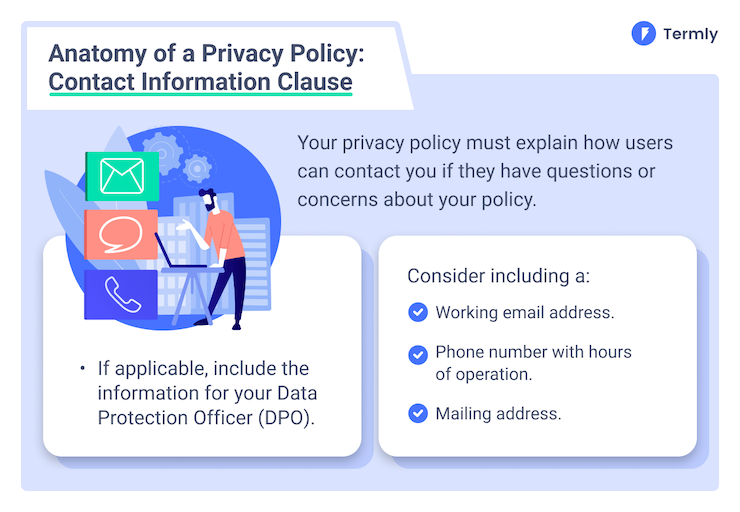
You should provide your company contact information directly in your privacy policy so consumers know how to reach you if they have questions or concerns.
Some laws, like POPIA, legally require this.
Where To Display Your Photography Website’s Privacy Policy
When considering where to put your photography website’s privacy policy, consider adding it to the following locations:
- In the website footer
- On any email sign-up or newsletter forms
- On scheduling forms
- On payment screens
- Anywhere on your site where data collection occurs
Why Data Privacy Is Important for Photographers
Photographers use a lot of personal data and must understand their legal obligations and responsibilities to keep that data safe and respect the rights of their clients.
Privacy laws apply to digital and physical personal data, meaning even printed copies of someone’s portrait could be considered personal information, particularly if you take photos of children, wedding photos, or other highly personal life events.
Many visitors to your photography website may not understand that you may collect their data or what rights they have in this process.
A professional photography business should have a clear and comprehensive privacy policy statement to clarify your data collection practices, inform them of their data rights, and comply with federal, state, and even international laws.
Summary
These days, it’s very common for photography websites to collect personal data from website visitors, which makes having a privacy policy essential.
Photographers often collect names and payment information when booking new clients. It’s also common to send weekly newsletters or use Google AdSense, Analytics, or targeted advertising on your website.
Fortunately, you can use Termly’s free privacy policy generator to easily make a comprehensive policy for your photography site in minutes.


